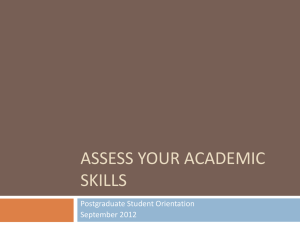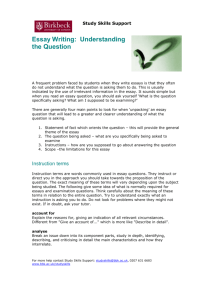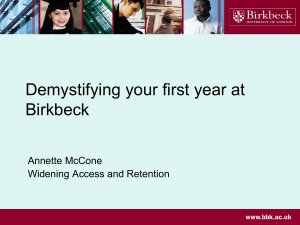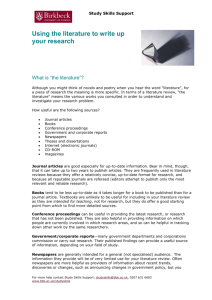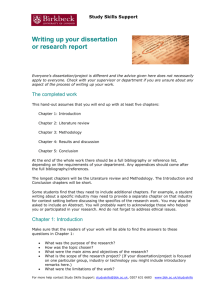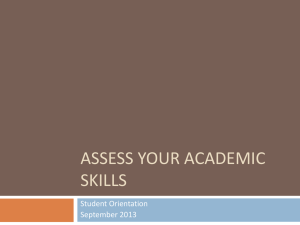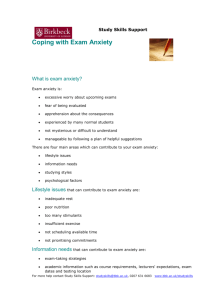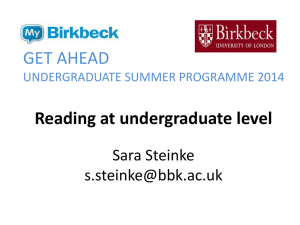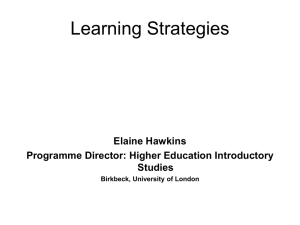Researching Skills
advertisement
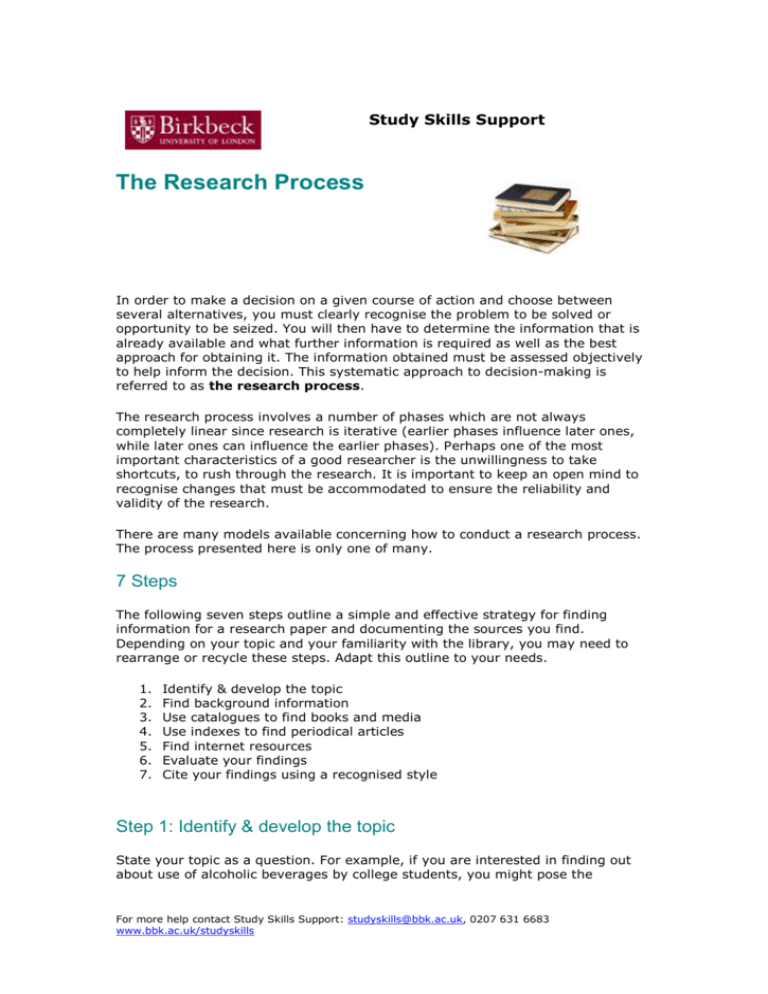
Study Skills Support The Research Process In order to make a decision on a given course of action and choose between several alternatives, you must clearly recognise the problem to be solved or opportunity to be seized. You will then have to determine the information that is already available and what further information is required as well as the best approach for obtaining it. The information obtained must be assessed objectively to help inform the decision. This systematic approach to decision-making is referred to as the research process. The research process involves a number of phases which are not always completely linear since research is iterative (earlier phases influence later ones, while later ones can influence the earlier phases). Perhaps one of the most important characteristics of a good researcher is the unwillingness to take shortcuts, to rush through the research. It is important to keep an open mind to recognise changes that must be accommodated to ensure the reliability and validity of the research. There are many models available concerning how to conduct a research process. The process presented here is only one of many. 7 Steps The following seven steps outline a simple and effective strategy for finding information for a research paper and documenting the sources you find. Depending on your topic and your familiarity with the library, you may need to rearrange or recycle these steps. Adapt this outline to your needs. 1. 2. 3. 4. 5. 6. 7. Identify & develop the topic Find background information Use catalogues to find books and media Use indexes to find periodical articles Find internet resources Evaluate your findings Cite your findings using a recognised style Step 1: Identify & develop the topic State your topic as a question. For example, if you are interested in finding out about use of alcoholic beverages by college students, you might pose the For more help contact Study Skills Support: studyskills@bbk.ac.uk, 0207 631 6683 www.bbk.ac.uk/studyskills question, "What effect does use of alcoholic beverages have on the health of college students?" Identify the main concepts or keywords in your question. Step 2: Find background information Look up your keywords in the indexes to subject encyclopaedias. Read articles in these encyclopaedias to set the context for your research. Note any relevant items in the bibliographies at the end of the encyclopaedia articles. Additional background information may be found in your lecture notes, textbooks, and readings. Step 3: Use catalogues to find books & media Use keyword searching for a narrow or complex search topic. Use subject searching for a broad subject. Print or write down the citation (author, title, etc.) and the location information (call number and library). Note the circulation status. When you pull the book from the shelf, scan the bibliography for additional sources. Watch for book-length bibliographies and annual reviews on your subject; they list citations to hundreds of books and articles in one subject area. Check the standard subject subheading "--BIBLIOGRAPHIES," or titles beginning with Annual Review of... in the Birkbeck Library Catalogue. Step 4: Use indexes to find periodical articles Use periodical indexes and abstracts to find citations to articles. The indexes and abstracts may be in print or computer-based formats or both. Choose the indexes and format best suited to your particular topic; ask at the reference desk if you need help figuring out which index and format will be best. You can find periodical articles by the article author, title, or keyword by using the periodical indexes in the Library Gateway. If the full text is not linked in the index you are using, write down the citation from the index and search for the title of the periodical in the Birkbeck Library Catalogue. The catalogue lists the print, microform, and electronic versions of periodicals at Birkbeck. Step 5: Find internet resources Use search engines (Google, Ask, Alta Vista, etc) and subject directories to locate materials on the Web. Check to see if your class has a bibliography or research guide created by librarians. Step 6: Evaluate your findings See How to Critically Analyse Information Sources and Distinguishing Scholarly from Non-Scholarly Periodicals: A Checklist of Criteria (My Birkbeck research skills http://www.bbk.ac.uk/mybirkbeck/services/facilities/support/research-skills ) for suggestions on evaluating the authority and quality of the books and articles you located. If you have found too many or too few sources, you may need to narrow or broaden your topic. Check with a reference librarian or your lecturer. Step 7: Cite your findings using a recognised style For more help contact Study Skills Support: studyskills@bbk.ac.uk, 0207 631 6683 www.bbk.ac.uk/studyskills Give credit where credit is due; cite your sources. Citing or documenting the sources used in your research serves two purposes: it gives proper credit to the authors of the materials used, and it allows those who are reading your work to duplicate your research and locate the sources that you have listed as references. Knowingly representing the work of others as your own is plagiarism. (See My Birkbeck website http://www.bbk.ac.uk/mybirkbeck/services/facilities/support/plagiarism ). Use one of the styles listed below or another style approved by your lecturer. Available online: Cornell University Library gateway guide to citation tools and styles http://www.library.cornell.edu/services/citing.html Harvard (author/date style) http://www.bournemouth.ac.uk/library/citing_references/docs/Citing_Refs .pdf – Bournemouth University American Psychological Association (APA) http://library.curtin.edu.au/research_and_information_skills/referencing/a pa.pdf – Curtin University of Technology, Australia Modern Language Association (MLA) examples http://campusgw.library.cornell.edu/newhelp/res_strategy/citing/mla.html Style guides in print (book) format: o o Gibaldi, Joseph. MLA Handbook for Writers of Research Papers. 6th ed. New York: MLA, 2003. This handbook is based on the MLA Style Manual and is intended as an aid for college students writing research papers. Included here is information on selecting a topic, researching the topic, note taking, the writing of footnotes and bibliographies, as well as sample pages of a research paper. Useful for the beginning researcher. Publication Manual of the American Psychological Association. 5th ed. Washington: APA, 2001. The authoritative style manual for anyone writing in the field of psychology. Useful for the social sciences generally. Chapters discuss the content and organisation of a manuscript, writing style, the American Psychological Association citation style, and typing, mailing and proofreading. If you are writing an annotated bibliography, see How to Prepare an Annotated Bibliography. Research tips Work from the general to the specific. Find background information first, then use more specific and recent sources. Record what you find and where you found it. Set up a system to record the complete citation for each source you find; you may need it again later. Translate your topic into the subject language of the indexes and catalogues you use. Check your topic words against a thesaurus or subject heading list. Need help clarifying your topic? Need ideas about where to look next? Want to be sure you're using a reference source effectively? Ask a librarian. For more help contact Study Skills Support: studyskills@bbk.ac.uk, 0207 631 6683 www.bbk.ac.uk/studyskills Adapted with permission: Reference Department Collections, Reference, Instruction & Outreach (CRIO) Cornell University Library Ithaca, NY, USA http://www.library.cornell.edu/olinuris/ref/research/skill1.htm Links British Library Public Catalogue http://catalogue.bl.uk/F/?func=file&file_name=login-bl-list – Lists over 13 million items in the library’s collection. Copac Academic & National Library Catalogue http://copac.ac.uk/ – Gives free access to the merged online catalogues of major University and National Libraries in the UK and Ireland, including the British Library. Birkbeck e-Library http://www.bbk.ac.uk/lib/elib/ Birkbeck Library Catalogue http://ipac.lib.bbk.ac.uk/#focus London Public Libraries http://www.londonlibraries.org/servlets/libraries/public Evaluating Web Pages http://www.lib.berkeley.edu/TeachingLib/Guides/Internet/Evaluate.html – University of California Berkeley Library’s tutorial to finding and evaluating information on the internet, USA. Internet Research Skills http://www.collectionscanada.gc.ca/education/0083040-e.html – Library & Archives Canada – Includes choosing the right tools for searching the web and evaluating internet sources. Library Research Roadmap http://www.library.yorku.ca/roadmap/ – York University, Canada. Evaluating Information Found on the Internet http://www.library.jhu.edu/researchhelp/general/evaluating/ – Johns Hopkins University Sheridan Libraries, USA. For more help contact Study Skills Support: studyskills@bbk.ac.uk, 0207 631 6683 www.bbk.ac.uk/studyskills
